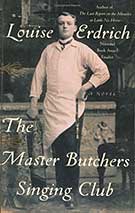Father John Folmer, of the Sacramento Catholic diocese, gave a fascinating lecture this evening on John Ronald Reuel Tolkien (pictured left), author of The Hobbit and The Lord of the Rings. These are my notes from the evening.
Fr. Folmer became acquainted with Prof. Tolkien in the mid 60s, when he was a theology student in Europe, through Tolkien’s son John, a Catholic priest. Fr. Folmer described an interaction in which he had told Prof. Tolkien that everyone he met in Germany kept on trying to get him to pronounce his name in a more German way. Tolkien then recounted a story of when he was in the first World War. After a battle he came across an injured German officer and in German, asked him if he would like some water. The officer replied that he would. And after Tolkien brought him some water, the officer proceeded to lecture Tolkien regarding his German pronunciation.
Tolkien was born in South Africa and returned to England with his mother and younger brother when he was three. His father died in South Africa before he could rejoin them. His mother received help from both sides of the family to raise her family, until she converted to Catholicism, which alienated both sides of the family from her. She died of diabetes when Tolkien was still quite young and JRR (Ronald as he was known) and his younger brother were taken care of by a Catholic priest from the Birmingham Oratory, founded by John Henry Cardinal Newman.
Continue reading →

The Curious Incident of the Dog in the Night-Time is told in the first person by Christopher John Francis Boone, a 15 year old autistic boy, who sets off on a detective mission to discover who killed his neighbor’s dog. Christopher counts forward in prime numbers, can’t tolerate the colors yellow or brown, avoids strangers, is easily overwhelmed by noise or crowds, and always tells the truth.
We don’t often get a glimpse into the minds and worlds of people so different from ourselves. Author Mark Haddon takes us on a touching journey of how this boy’s world unravels and comes together again as he bumps up against the very real human failings of those closest to him. We feel his anguish and also the comfort he finds in his world of abstract problem solving. The book has several mind-stumping math problems, that Christopher delights in solving for us. One in particular, the Monty Hall problem, was really annoying. It’s the kind of problem that makes you sit down, take out a pen and paper and try to make sense of it. But you can’t. Or most people can’t. I think that is part of the interesting charm of this book. We the readers are as closed off to the world which Christopher inhabits, as he is to our world. As smart as I was in math, these problems confused me, made my brain hurt. As brilliant as Christopher is, it takes every ounce of his mental focus to take a simple subway ride.
Highly recommended.

That Louise Erdrich likes to tell stories becomes obvious from the reading of her novel The Master Butchers Singing Club. She never races through a tale, but takes her time, dissecting every nuance in delicious detail. The book’s central character is Delphine, whom we meet as she is returning home to Argus, North Dakota in the early 1930s with her balancing act partner Cyprian to care for her father, the town drunk. Delphine is a survivalist – a hard working, tough love, feet-firmly-planted-on-the-ground woman. She befriends Eva, the wife of the local butcher, Fidelis Waldvogel, who had immigrated to Argus from Germany after the first world war. Fidelis starts a singing club, the members of which make up many of the contributing characters of the story.
Continue reading →

What a howler. Reminiscent of Mickey Spillane, Carl Hiassen’s Skinny Dip starts with crooked sleeze-ball Charles Perrone throwing his wife off a cruise ship miles away from the coast of Florida. Unbeknownst to Chaz, his wife Joey, was a champion swimmer and athlete in college, and turning her fall into a dive, survives the fall, swims to near exhaustion, eventually latches on to a floating bale of marijuana, and is picked up out of the ocean by a retired cop Mick Stranahan. Joey doesn’t understand why Chaz tried to kill her and spends the bulk of this hilarious story with Stranahan figuring out why and taking revenge by driving her husband crazy. The book is filled with great character sketches – Tool, a pain-killer addicted hired thug who gets reformed by the terminally ill old lady whose meds he tried to steal, Red Hammernut, the agribusiness tycoon who is paying off Chaz to falsify water quality records so he can keep his polluting enterprise up and running, and Karl Rolvaag, the homicide detective who keeps two albino pythons and when they escape is disturbed when the yappy dogs of neighbors go missing.
Continue reading →

If only all science books were as entertaining as Bill Bryson’s A Short History of Nearly Everything. Bryson explains the major scientific theories known to man with masterful storytelling skills. Weaving in richly researched details on the lives and characteristics of the foremost historical scientific figures, Bryson discourses on everything from the big bang theory and quantum physics, to paleontology and plate tectonics. As he put it, the book is about “…how we went from there being nothing at all to there being something, and then how a little of that something turned into us, and also what happened in between and since.” Not just detailing what we know, Bryson describes how we learned what we now know.
Continue reading →
Forgiveness is the wind-blown bud
which blooms in placid beauty at Verdun.
Forgiveness is the tiny slate-gray sparrow
which has built its nest of twigs and string
among the shards of glass upon
the wall of shame.
Forgiveness is the child who
laughs in merry ecstasy
beneath the toothed fence that
closes in Da Nang.
Forgiveness is the fragrance of the violet
which still clings fast to the
heel that crushed it.
Forgiveness is the broken dream
which hides itself within the corner of the mind
oft called forgetfulness so that
it will not bring pain to the dreamer.
Forgiveness is the reed
which stands up straight and green
when nature’s mighty rampage halts, full spent.
Forgiveness is a God who will not leave us
after all we’ve done.
by George Roemisch



